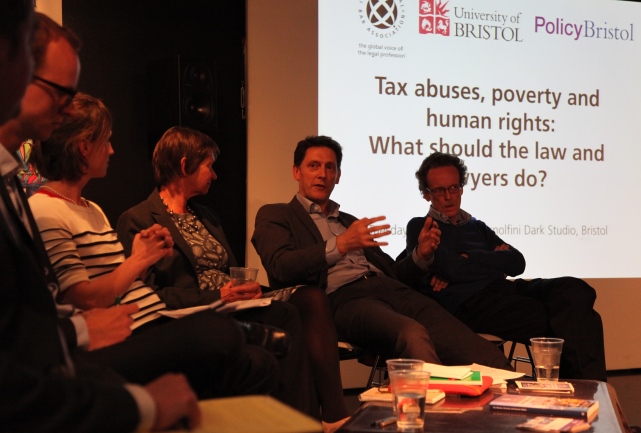Where should the line between legitimate tax avoidance and immoral tax abuse be drawn? What are the responsibilities of governments, corporations and legal professionals in combating tax abuse? Tax revenues lost by the developing world due to tax abuse are estimated at $120bn per annum. This is equivalent to the total amount of aid provided to these countries each year and the situation is worsening. Recovering the lost tax would make a substantial contribution to the alleviation of poverty.
Last week PolicyBristol and the International Bar Association’s Human Rights Institute hosted a high level panel discussion addressing these issues. The event was chaired by Shirley Pouget, Senior Programme Lawyer at the IBAHRI and panellists were:
- Anders Dalhbeck Tax Justice Policy Advisor at ActionAid
- Celia Wells Head of Bristol University Law School
- Lloyd Lipsett Advisor at Shift
- Thomas Pogge Director of the Global Justice Program and the Leitner Professor of Philosophy and International Affairs at Yale University
- Ben Dickinson Head of the Tax and Development Programme at the Organisation for Economic Co-operation and Development (OECD)
The topic of tax avoidance has been drawing headlines recently on a micro-economic scale (Gary Barlow’s tax activity being an example of a celebrity abusing tax laws) and the matter is becoming increasingly publicised. In discussing the relationship between tax abuses and poverty, the panel argued that the current economic crisis has created a strain on financial policy, felt by members of the public and therefore raising the stature of the issue; they considered that all tax avoidance cases should be viewed as criminal.
The discussion moved on to the macro level, whereby multi-national companies are able to exploit tax laws in less economically developed countries. We learnt that approximately 60% of companies are exploiting tax laws in developing countries and finding loop-holes to minimise expense (loop-holes which mask the distinction between tax evasion and tax avoidance). Companies obviously seek to minimise costs in order to remain competitive, but to what extent are they aware of the impact their tax avoidance has on these countries and how this relates to human rights exploitation and poverty?
In avoiding paying high taxes by funnelling operations through developing countries, organisations are able to gain a competitive advantage. However, the gain for developing countries is minimal and the tax that should be paid could go a long way to aiding the poverty crisis; although questions were raised around whether developing countries have the capability or expertise to exercise sufficient tax laws – it was argued that politicians in developing countries can be easily influenced by bribes from organisations, ignoring the human rights implications. The links between tax abuse and human rights are clear: more money available to less developed countries would invariably lead to better health, less starvation and reduced risk of disease through better water and sanitation provision.
The debate turned to where the responsibility for tax abuse lies – with companies or with government? It was felt that multi-national organisations should be aware of their corporate social responsibility, though it was recognised that tax evasion seems to be considered necessary in order to remain competitive in difficult economic markets (with the distinction between tax evasion and tax avoidance clearly drawn). What, therefore, can the law and lawyers do?
There is a need for legal reform, strict punishments and eradication of loop-holes. Tax avoidance needs to be moved higher up the political agenda, due to the clear implications for human rights and poverty. Suggestions were put forward regarding how to progress on this issue from the perspective of developing countries: for example, sending individuals with knowledge and expertise into these countries to audit the tax laws.
It was concluded that overall, the responsibility lies with both the companies and governments involved. Corporate social responsibility has grown in prominence within organisational mission statements, but there is a need for this to be implemented in accordance with tax evasion principles. These principles and the related legislation should be enforced by governments on both sides of the tax avoidance divide.
——————-
In 2013 the IBAHRI launched an expert Task Force report entitled Tax Abuses, Poverty and Human Rights, examining tax abuses from the novel perspective of human rights law and policy.


